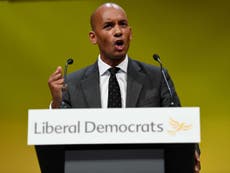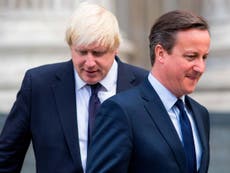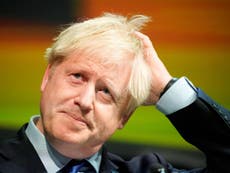Random acts of madness: all the things that Dominic Cummings is getting wrong about game theory
It is all very well playing the most cunning game of 4D chess ever – but you start to look foolish if you didn’t realise a third player was likely to start moving your pieces for you
It has been reported by sources close to Downing Street that the prime minister’s advisor, Dominic Cummings, is a fan of game theory. And so the speculation is that he is applying some of its main principles and insights to inform the actions taken – and strategies adopted – by Boris Johnson as the country jolts and lurches towards Brexit. But is Cummings “playing the game” correctly?
One fundamental principle of game theory is that you know what the game is in the first place. You must know who the players are, what their objectives are, and the potential actions they have at their disposal.
So where does that leave us on Brexit? In the recent negotiations, it would be reasonable to identify the UK government and EU as the two players. As such, under game theory, everything Johnson has done since becoming prime minister is formulated with the EU in mind as the other player.
For example, the most critical action, decided in August, to seek to suspend parliament is part of a strategy to establish “credibility” for Johnson’s “do or die” pledge to Brexit with or without a deal by 31 October. This was aimed at persuading the other player of the game – the EU – to make concessions and give the UK a “better”, or at least different, deal.
However, there has been one clear oversight in the Cummings strategy.
In promoting a “do-or-die” pledge to leave the EU by the (current) deadline date of 31 October, with or without a deal, Johnson and Cummings did not sufficiently recognise that there are other key players of the Brexit game: namely, the MPs.
It is all very well playing the most cunning game of 4D chess, but you start to look foolish if you didn’t realise a third player was entirely likely to start moving your pieces for you.
MPs are definitively crucial players after their successful move in parliament early this month to thwart Johnson’s ability to carry out his “do or die” pledge – at least in its current form.
Game theory is as much about empathy as it is strategy, and it is crucial to understand what drives your “opponent”. Strategic reasoning – as emphasised and developed in game theory – is about putting oneself in the shoes of the other players in the game being played. That is, before deciding on what actions to take, and before selecting one’s strategy, it is critical to first think through how other players in the game – be it the EU, the leader of the opposition or other MPs – would react to the several alternative actions that one could choose from.
It is this “what if” style of reasoning that lies at the heart of game theory: determining the “what if”, as if you were the other player.
One recent example which has, arguably, shown a lack of strategic reasoning from Johnson and Cummings is their attempt to suspend parliament – thereby blocking MPs from averting a no-deal Brexit.
First, the move to prorogue was widely publicised and provided MPs with a full week to take action, prior to its suspension. This failure to recognise that MPs would/could act decisively, intensely and very likely successfully (as they were in the end), is a failure to appreciate this second fundamental principle of game theory: as in physics, any action will invite a reaction.
Not only were MPs missed as key players in the Brexit game, their capacity for disruptive action was also misjudged.
The need to anticipate the different and responsive moves of your fellow players, before they have happened, and then make decisions informed by such a “what if” analysis, lies at the heart of game theory. It is known as the “look forward and reason backward” principle. To succeed in the game, you must be able to look ahead to all possible future outcomes – and use this foresight to establish the most suitable immediate choice.
It is not clear to me that this principle was applied by the government in their recent actions, or at least not as meticulously as it should have been. Had it been deployed, the timing of the decision to suspend parliament would have been later than it was – pre-empting the defensive manoeuvres from MPs.
Another core part of the strategy employed by Cummings et al in Brexit negotiations thus far appears to be brinkmanship – another key concept in game theory. The core idea is the deliberate creation of risk. The risk should be sufficiently intolerable to the other player – in this case the EU – to induce the player to back down and make concessions. Johnson’s “do or die” pledge may be read as an attempt to create this “intolerable risk”.
And so it is like cars playing “chicken”: two people drive towards each other and one driver wins by not swerving out of the way of the oncoming opponent. The longer you wait the more the other believes you won’t yield. So it is possible to imagine that Cummings has conceptualised Brexit’s “deal or no deal” decision as a game of chicken, played in real time, with Johnson at the wheel.
The catch, of course, is that such brinkmanship has to be credible, and so needs to be backed up with random acts of madness – behaviour that is not typically desirable from a prime minister within a democratic political system.
The UK government is now waiting for the UK Supreme Court to decide on Tuesday whether its prorogation of parliament was unlawful. But in the meantime there have been reports that the government may seek to circumvent legislation requiring an extension to be requested if a deal is not reached by the deadline of 31 October. These actions may be read as brinkmanship, and part of Johnson’s attempt to establish his credentials as irresponsible to the point of lunacy in order to incite the EU to action.
The question is, and the crucial point when it comes to game theory, is when the risk of his strategy becomes intolerable for the fourth player in the game, the one who fired the starting pistol, but has yet to make another move – the UK people.
Abhinay Muthoo is Dean of Warwick in London. He is also a professor of economics in the department of economics and the author of “Bargaining Theory with Applications”







Join our commenting forum
Join thought-provoking conversations, follow other Independent readers and see their replies